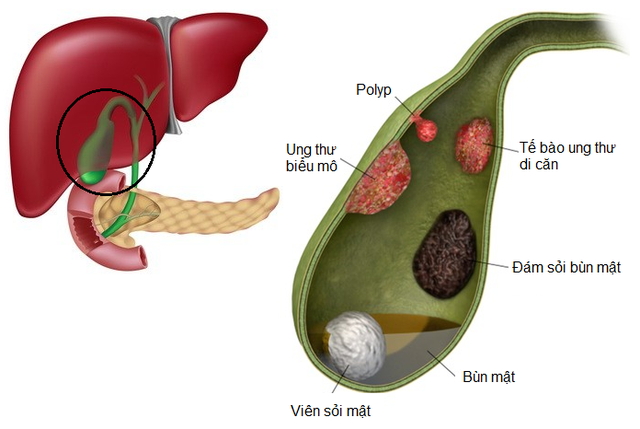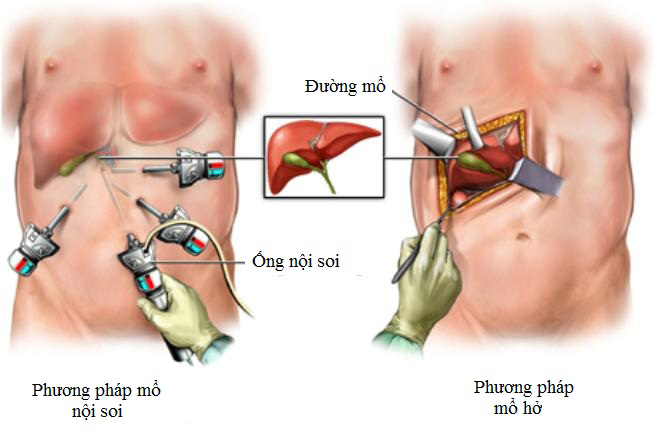Gallbladder polyps: Concern about the possibility of cancer
The article was written by Dr. Bui Xuan Truong - Department of General Internal Medicine - Vinmec Times City International Hospital
Gallbladder polyps are quite common, gallbladder polyps can appear at any age, and there is no significant difference in incidence between men and women. However, in fact, gallbladder polyps are mainly seen in adults, very rarely in children. The prevalence of gallbladder polyps in the community ranges from 0.03% to 9%. Survey data from East Asia show that the prevalence of gallbladder polyps in adults ranges from 4% to 7%.
1. What are gallbladder polyps? Gallbladder polyp is the medical term to describe the tissue morphologies arising from the gallbladder wall and protruding into the gallbladder lumen. Organizational morphologies have different structural nature, which can be benign (non-cancerous) or non-benign (cancerous). Over 95% of gallbladder polyps are benign tissues, of which the most common (40-70%) are cholesterol polyps (cholesterol is a fatty substance present in cell membranes and circulating in the blood with a certain concentration). Next are polyps formed by inflammation, polyps formed by proliferation of glandular tissues, polyps with the nature of adipose tissue, adipose tissue, glandular tissue, vascular malformations, etc.
.
.
2. Manifestations of symptoms The number and size of gallbladder polyps are also quite diverse, but the most common is a polyp in the gallbladder with a size of less than 10 mm. Some people may have multiple polyps in the gallbladder or polyp sizes up to 20-40 mm, or have both polyps and gallstones. Most cases of gallbladder polyps have no symptoms and are discovered incidentally during a routine physical exam or for other reasons. Only about 6-7% of gallbladder polyp patients have symptoms, the most common is pain under the right flank or pain above the navel, a few have nausea - vomiting, slow digestion and mild cramping. right lower quadrant.

3. Causes Many favorable factors for the formation of gallbladder polyps are interested to learn such as: hepatobiliary function, blood sugar concentration, blood fat concentration, obesity, eating habits, infection hepatitis virus... ...but in fact have not found specific evidence to correlate these factors with the formation of gallbladder polyps. Currently, with the development of imaging tools: ultrasound, endoscopic ultrasound, computed tomography (CT Scan), nuclear magnetic resonance imaging (MRI) have greatly helped in the diagnosis. gallbladder polyps.
Do gallbladder polyps require cholecystectomy? 95% of gallbladder polyps are benign (non-cancerous) in nature, so the patient does not need the intervention of cholecystectomy, can completely live peacefully with gallbladder polyps. The gallbladder is a component of the bile duct system, which plays a role in regulating bile secretion and food digestion, so it cannot be arbitrarily removed without an indication.
4. Will gallbladder polyps progress to cancer? In fact, one thing concerns everyone with gallbladder polyps: will my gallbladder polyps progress to cancer. This is an issue that doctors need to pay attention to and give adequate advice to patients with gallbladder polyps. If you have gallbladder polyps, when you go to the doctor, ask the following questions:
How often should I have a follow-up exam (3 months/1 time, every 6 months or every 12 months) I have 1 polyp in my gallbladder or many polyps in my gallbladder What is the size of the polyp, if there are many polyps, what is the size of the largest polyp What is the condition of my gallbladder wall How do I have gallstones with gallbladder polyps no polyps my gallbladder is pedunculated or pedunculated If my gallbladder polyp size is larger than 10 mm what additional tests are helpful Many doctors say the size Gallbladder polyps smaller than 10mm are not at risk of cancerous, is that true
How often should I have a follow-up exam (3 months/1 time, every 6 months or every 12 months) I have 1 polyp in my gallbladder or many polyps in my gallbladder What is the size of the polyp, if there are many polyps, what is the size of the largest polyp What is the condition of my gallbladder wall How do I have gallstones with gallbladder polyps no polyps my gallbladder is pedunculated or pedunculated If my gallbladder polyp size is larger than 10 mm what additional tests are helpful Many doctors say the size Gallbladder polyps smaller than 10mm are not at risk of cancerous, is that true
Based on the results of clinical examination and by means of imaging diagnostics, a specialist doctor's blood test will give you the right answers and advice, helping you not to worry too much. Do not proceed with unneeded cholecystectomy.
Bài viết này được viết cho người đọc tại Sài Gòn, Hà Nội, Hồ Chí Minh, Phú Quốc, Nha Trang, Hạ Long, Hải Phòng, Đà Nẵng.






